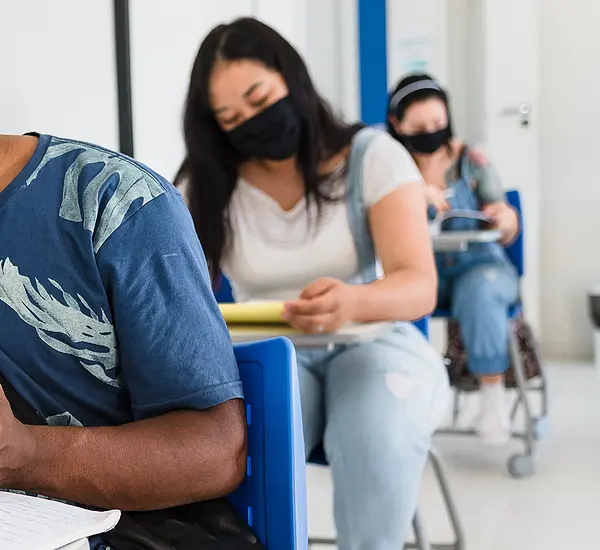How students pay for college: NPSAS data collection and insights
Higher education is a vital component of the lives and careers of millions of Americans. As the source of many grants and loans for students, the federal government has an interest in understanding how Americans pay for college.
Since 1987, the National Center for Education Statistics (NCES), part of the U.S. Department of Education, has kept track of the portfolio of grants and loans, personal savings, and other sources that students and families use to finance postsecondary education—uncovering important trends that influence college enrollment, completion, and labor market outcomes. This repeated cross-sectional study, which takes place approximately every 4 years, is known as the National Postsecondary Student Aid Study, or NPSAS.
RTI has been conducting NPSAS or one of its related longitudinal studies—the Beginning Postsecondary Students Longitudinal Study and the Baccalaureate and Beyond Longitudinal Study—since 1990.
Managing a Complex Study across Changes in Population and Technology
The most recently published NPSAS, which covered the 2019–2020 academic year, included more than 350,000 students across approximately 3,100 colleges and universities. The sample was larger than a standard NPSAS as NPSAS:20 included a state-representative administrative sample. The administrative sample, which only includes data from administrative sources, such as the institutions, federal financial aid records, and the Veterans Benefits Administration, enables users to make estimates at the state level.
From the administrative sample, about 173,000 graduate and undergraduate students were selected to be surveyed by web with a telephone interview follow-up for nonrespondents. Estimates from the survey can be combined with the matched administrative record data and are representative at the national level.
The administration of NPSAS:20 was marked by the onset of the COVID-19 pandemic in the spring of 2020. We worked in concert with our client, NCES, to transition the data collection help desk to fully remote work and to add relevant questions to the survey that provided a first look at how COVID-19 and the resulting shift to online courses affected students.
Postsecondary Data Collection Innovation
We are now working on NPSAS:24. Over the decades, making technological shifts in our methodologies—including the move to a web-based, mobile-optimized student survey and two-way texting—has enabled us to keep pace with our target population. As described above, NPSAS:24 uses administrative data from many sources. In a nightly process, we are able to preload some of that data into the survey database, thus reducing total response time for respondents.
On the data collection front, we have added the capability of two-way texting. Now when we text sample members an invitation to take the survey, we can communicate directly with them if they respond with questions or concerns. In addition to answering questions about the survey, two-way texting is another way for us to demonstrate legitimacy in an era when individuals are increasingly concerned about phishing attacks.
Focus on Equity
The NPSAS:24 survey covers timely topics, such as gig work, food and housing security, and the ongoing effects of COVID-19 on enrollment and job choices. It also includes the Office of Management and Budget’s new sexual orientation and gender identity item set. In response to NCES’s focus on diversity, equity, inclusion, and accessibility, subsets of questions focus on campus experiences, including harassment and discrimination, and among students with disabilities. One of RTI’s new small business partners, The Equity Paradigm, thoroughly reviewed all student materials for appropriateness and inclusiveness of the terminology used.
Partnerships Help Make NPSAS Better
A study as large and complex as NPSAS would not be possible without our diverse small business partners. Conducting NPSAS:24 involves more than 10 small business partners with specialized skills that complement RTI’s NPSAS team. In addition to The Equity Paradigm, another new partner for NPSAS:24 is the ARSIEM Corporation, a HUBZone and Small Disadvantaged Business focused on ensuring that the systems and data we collect stay safe. They perform vulnerability testing on high-risk targets, such as the public websites and data collection instruments, and provide assessments of how we can decrease security risks.

Adapting Postsecondary Data Collection to COVID-19
Learn how our help desks for NPSAS and other data collection efforts have managed during the pivot to remote work.
Setting the Groundwork for Additional In-Depth Studies of Students and Graduates
NPSAS data form the basis for other large, longitudinal education studies that we conduct. For the Beginning Postsecondary Students Longitudinal Study, we follow a cohort of students over a 6-year period, tracking their progress through college and into the labor market. In the Baccalaureate and Beyond Longitudinal Study, we survey recipients of bachelor’s degrees, particularly new teachers, on their education, employment, and family formation for the first 10 years after graduation. For both studies, we use NPSAS to identify representative populations and obtain baseline data. To supplement the longitudinal studies, we also collect sample members’ transcripts through the Postsecondary Education Transcript Studies.
NPSAS and its related studies are trusted resources for the education and policy communities. We expect to continue our record of innovation and quality improvement as we lead NPSAS into the future.
- National Center for Education Statistics (NCES)




